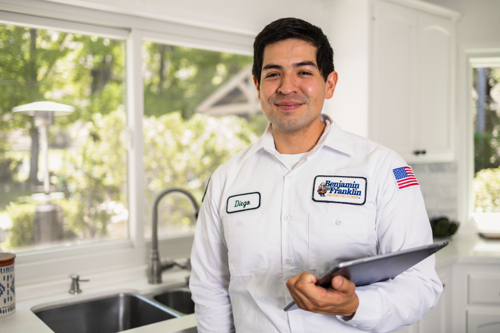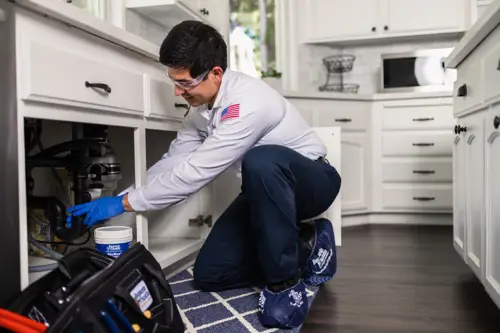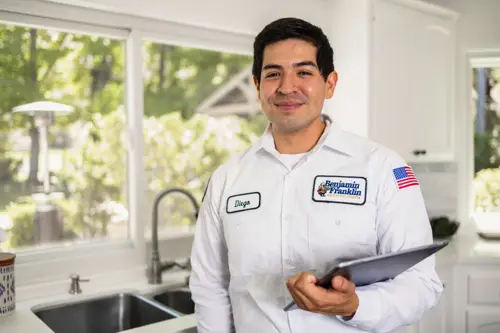 Ever wondered if you can just grab any faucet off the shelf and stick it on your sink? Well, it’s not quite that simple! Let’s break down everything you need to know about matching faucets to sinks, because trust me, getting it wrong can be a real headache. We’ll walk you through what you need to know to match faucets to sinks. If you are uncomfortable with any of the steps to install a faucet, reach out to the pros at Benjamin Franklin in Miami, FL.
Ever wondered if you can just grab any faucet off the shelf and stick it on your sink? Well, it’s not quite that simple! Let’s break down everything you need to know about matching faucets to sinks, because trust me, getting it wrong can be a real headache. We’ll walk you through what you need to know to match faucets to sinks. If you are uncomfortable with any of the steps to install a faucet, reach out to the pros at Benjamin Franklin in Miami, FL.
Understanding Sink Configurations
Ready make changing the faucet a DIY project? First things first: What kind of sink are you working with? In bathrooms, you’ll typically see two main types. There’s the drop-in sink – you know, the kind that sits on top of your counter with that little lip around the edge. Then there’s the undermount sink, which hangs underneath your counter for that sleek, modern look. Why does this matter? Well, it affects where your faucet will actually get installed. Recognizing your sink type helps narrow down your faucet options, making the replacement process much smoother.
Counting Faucet Holes
Now, here’s the really important part – counting holes! Your sink probably has either one or three holes drilled into it. If you’ve got separate hot and cold handles, you’re looking at three holes (one for each handle and one for the spout in the middle). Pretty straightforward, right?
But wait, there’s more! The spacing between these holes is super important. If they’re spread out six inches or more, you’ll need what’s called a “widespread” faucet. Less than six inches? You’re in “centerset” territory. Getting these measurements right is crucial – nobody wants to bring home a fancy new faucet only to find out it won’t fit!
Ben Franklin Plumbing Pro Tip: sometimes sinks are sneaky and hide extra holes under decorative plates. Before you go shopping, grab a flashlight and take a peek underneath your sink. You might discover more options than you thought you had!
Removing an Existing Faucet
Start by shutting off the water supply. Use the shut-off valves located under the sink, or turn off the main water line if necessary. After that, open the faucet to drain any remaining water from the lines.
Tools and Process
Here’s how to detach the faucet:
- Use a basin wrench to loosen the nuts securing the water lines.
- If the nuts are stuck, apply penetrating oil and let it sit for a few minutes to help loosen them.
- Unscrew the larger nuts holding the faucet in place.
Detaching the Faucet
If the faucet is stuck, gently pry it loose using a putty knife. Once it’s removed, count the sink holes and measure the spacing. This step ensures you get a compatible replacement faucet.
Workarounds for Mismatched Configurations
Now, what if your dream faucet doesn’t quite match your sink’s setup? Don’t worry! There are some clever workarounds. You can use a baseplate to cover up extra holes, or go for a bridge faucet that might work better with your configuration. You’ve got options!
Final Steps and Shopping Tips
When you’re ready to shop, here’s what I recommend: take pictures of your sink and bring your measurements with you. It’ll make the whole process so much easier. And don’t forget to check those package labels – they’ll tell you exactly what kind of sink setup the faucet works with.
Bottom line? You can’t just mix and match any faucet with any sink, but with a little planning and the right measurements, you can definitely find one that works perfectly. Take your time, do your homework, and you’ll end up with a faucet that not only fits like a glove but looks fantastic too! If you are unsure about matching faucets to sinks, call the pros at Benjamin Franklin Plumbing!
 Hey there Miami, FL homeowners! Ever wondered whether you need to call a plumber fto unclog a drain that is stubborn? Let’s talk about what you can try to unclof a drain on your own and when it’s time to bring in the professionals at Service Minds Ben Franklin!
Hey there Miami, FL homeowners! Ever wondered whether you need to call a plumber fto unclog a drain that is stubborn? Let’s talk about what you can try to unclof a drain on your own and when it’s time to bring in the professionals at Service Minds Ben Franklin! Miami, Florida homeowners often deal with clogged drains. If you’re dealing with a clogged drain, you’ve probably heard about drain snakes (or plumber’s snakes) as a potential solution.
Miami, Florida homeowners often deal with clogged drains. If you’re dealing with a clogged drain, you’ve probably heard about drain snakes (or plumber’s snakes) as a potential solution. Your sump pump helps protect your Miami, Florida home from water damage. It’s basically the unsung hero of home maintenance. But like any hardworking appliance, sometimes it needs some TLC. If your sump pump starts acting up, how do you know if it’s time to replace it, or if you should call a Benjamin Franklin pro for
Your sump pump helps protect your Miami, Florida home from water damage. It’s basically the unsung hero of home maintenance. But like any hardworking appliance, sometimes it needs some TLC. If your sump pump starts acting up, how do you know if it’s time to replace it, or if you should call a Benjamin Franklin pro for Let’s talk about something most Miami, FL homeowners don’t think about until disaster strikes: sump pumps. These little lifesavers sit quietly in your basement, ready to prevent water from turning your home into an indoor swimming pool. But what happens when they fail? Sump pump failure can happen, and when they do, it can lead to some serious problems.
Let’s talk about something most Miami, FL homeowners don’t think about until disaster strikes: sump pumps. These little lifesavers sit quietly in your basement, ready to prevent water from turning your home into an indoor swimming pool. But what happens when they fail? Sump pump failure can happen, and when they do, it can lead to some serious problems. Hey there Miami, Florida homeowners! Let’s talk about something most people ignore: that annoying leaking faucet. You know, the one that goes “drip… drip… drip” in the middle of the night?
Hey there Miami, Florida homeowners! Let’s talk about something most people ignore: that annoying leaking faucet. You know, the one that goes “drip… drip… drip” in the middle of the night? Let’s be real – a leaky faucet is more than just an irritating background noise. It’s costing you money and wasting water with every single drop. The good news? Most Miami, FL homeowners can probably fix this themselves without calling for a professional at Ben Franklin Plumbing. With the right tools and some guidance, you may be able to
Let’s be real – a leaky faucet is more than just an irritating background noise. It’s costing you money and wasting water with every single drop. The good news? Most Miami, FL homeowners can probably fix this themselves without calling for a professional at Ben Franklin Plumbing. With the right tools and some guidance, you may be able to  Ever stepped out of the bathroom only to hear that annoying “drip… drip… drip” sound? You’re not alone. Many Miami, FL, homeowners deal with the irritating issue of a shower dripping. While it might seem like just a small annoyance, that persistent dripping isn’t just driving you crazy – it’s probably hiking up your water bill too. Let’s talk about what’s causing it and how you can fix it. Some reasons behind shower dripping are simple DIY projects. Others need the touch of a plumbing professional from Ben Franklin.
Ever stepped out of the bathroom only to hear that annoying “drip… drip… drip” sound? You’re not alone. Many Miami, FL, homeowners deal with the irritating issue of a shower dripping. While it might seem like just a small annoyance, that persistent dripping isn’t just driving you crazy – it’s probably hiking up your water bill too. Let’s talk about what’s causing it and how you can fix it. Some reasons behind shower dripping are simple DIY projects. Others need the touch of a plumbing professional from Ben Franklin. Hey there! Ever step into your shower and wonder why the water pressure feels off, or why you’re suddenly getting blasted with cold water? Chances are, your shower valve might be trying to tell you something. Let’s talk about how to spot the signs of a failing shower valve before it turns into a bigger headache.
Hey there! Ever step into your shower and wonder why the water pressure feels off, or why you’re suddenly getting blasted with cold water? Chances are, your shower valve might be trying to tell you something. Let’s talk about how to spot the signs of a failing shower valve before it turns into a bigger headache. If you’re reading this, you might be worried about a slab leak in your home. Trust me, I get it – it’s not exactly a fun topic, but it’s super important to understand what you’re dealing with. Slab leaks are one of the most severe plumbing problems a Miami, FL, homeowner can face. They are hard to detect, so it’s easy for them to go undetected for a long time. By the time the
If you’re reading this, you might be worried about a slab leak in your home. Trust me, I get it – it’s not exactly a fun topic, but it’s super important to understand what you’re dealing with. Slab leaks are one of the most severe plumbing problems a Miami, FL, homeowner can face. They are hard to detect, so it’s easy for them to go undetected for a long time. By the time the